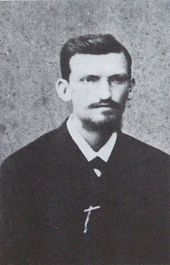Georg Ziegler (missionary)
Georg Ziegler , also Johann Georg Ziegler (born July 29, 1859 in Eschelbronn ; † January 13, 1923 in Heidelberg ) was a German Protestant missionary in China as well as an honorary doctorate from the theological faculty of the Ruprecht-Karls-Universität Heidelberg and General Praeses of the Basel Evangelical Mission Society in China.
Life
Georg Ziegler was born as the son of Martin Ziegler, the operator of the Ziegler'sche Mühle , in Eschelbronn and initially worked as a miller in the family business. He received his confirmation from Pastor Spengler from Eichtersheim . His decision to leave the family business and work as a theologian was significantly influenced by a sermon that Robert Pearsall Smith , a formative figure of the sanctification movement , gave in Heidelberg in 1875.
Ziegler married the pastor's daughter Johanna Spengler (1863–1952) in China on October 16, 1888. The marriage had six children. The son Gerhard Ziegler died on October 1, 1918 in the First World War .
In 1881 Ziegler joined the mission house of the Basel Mission . On July 27, 1885, he was ordained a missionary by Pastor Schück in the Evangelical Church in Hoffenheim and in the same year he traveled to China , where he worked as a missionary, initially at the Hokschuha mission station. During his tenure there, the congregation grew from 196 to 256 members, the number of students doubled and the number of baptismal applicants tripled.
From 1896 he taught theology at the Basel Mission in Lilong in the former Bao'an district , where he was chairman of the preachers' seminary from 1900 and general president of the mission from 1907 . In 1916 he was awarded an honorary doctorate from the theological faculty of the Ruprecht-Karls-Universität Heidelberg . In the certificate of appointment it was noted:
“He administered the apostolic office of missionary with zeal and prudence, successfully led the theological seminary, directed the entire work as General Praeses, and especially during the World War he tirelessly spread the seeds of eternal life and the visible kingdom of the God of peace, who we wait, set up. "
During World War I, missionaries were banned from traveling to China. After the war, Ziegler, like other missionaries, should also be expelled. However, the expulsion was prevented by a counter-presentation by Chinese Christians.
Ziegler is considered a biblicist and viewed the crucifixion and resurrection of Jesus Christ as the core of his theology and a central element of the Holy Scriptures . While working in China, he wrote several writings on the popular religion, customs and traditions of the country.
In 1920 Ziegler ended his 35-year stay in China; he moved back to Baden-Württemberg. From 1921 he suffered from neuropathy and died on January 13, 1923 of a myocardial infarction . He was buried on January 16 at the Eschelbronn cemetery. There has been a memorial plaque above his grave since 1997.
Works
- Magic and fortune telling in China , 1898
- Chinese Morals and Relationships versus Biblical Israeli , 1900
Web links
Individual evidence
- ↑ a b Personal details on the image description for the recording Seminary in Lilong, China ( Memento of the original from September 27, 2013 in the Internet Archive ) Info: The archive link was inserted automatically and has not yet been checked. Please check the original and archive link according to the instructions and then remove this notice.
- ↑ a b c eschelbronn-online.de
- ↑ a b c d e f g h i Wilfried Wolf: A great son of our village: Georg Ziegler in 1200 years Eschelbronn, 789–1989 , page 84
- ^ Lixin Sun: The image of China by the German Protestant missionaries of the 19th century, A case study on the problem of intercultural encounter and perception , Tectum Verlag DE, 2002, page 140 f.
| personal data | |
|---|---|
| SURNAME | Ziegler, Georg |
| ALTERNATIVE NAMES | Ziegler, Johann Georg (full name) |
| BRIEF DESCRIPTION | German evangelical missionary |
| DATE OF BIRTH | July 29, 1859 |
| PLACE OF BIRTH | Eschelbronn |
| DATE OF DEATH | January 13, 1923 |
| Place of death | Heidelberg |

